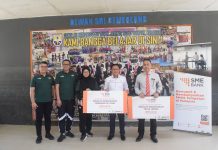HP Inc. recently unveiled a new study with Oxford Economics revealing enthusiasm among global leaders to use technology, including AI, to advance key impact goals.
The study of business executives and government officials in 10 countries found 3 out of 4 leaders believe technology is key to expanding economic opportunity (76%) and that AI will help drive progress towards sustainability and social impact goals (76%).
Further, business leaders are either already using AI or plan to in the next 1-2 years for goals such as increasing access to digital education (90%), workforce development (89%), and workforce diversity (86%).
“At HP, we see immense promise for AI to accelerate our own Sustainable Impact,” said Ernest Nicolas, HP Chief Supply Chain Officer. “From data scientists in Kenya who are using our workstations to help local farmers build more resilient businesses, to first-time tech users leveraging AI PCs to help them enter the workforce, there is no shortage of applications to move our communities forward.”
Accelerating digital equity for 150 million people by 2030
About one-third of the global population remains offline, costing the world billions of dollars in lost GDP each year. The digital divide has been growing since the advent of technology, and AI could exacerbate these disparities.
“Everyone deserves an opportunity to access the tools needed to thrive in the digital economy,” said Alex Tan, Managing Director of HP Malaysia. “We know technology can be a great equalizer and a powerful tool to drive progress. Yet, to truly narrow the digital divide in our rapidly evolving world, we must also equip individuals with the skills to use technology.
“For example, through our partnership with the National Cancer Society of Malaysia, we have reached thousands with essential education and support services, highlighting the impact of technology in transforming lives.”
In its latest Sustainable Impact report released today, HP announced it has accelerated digital equity for more than 45 million people since 2021, bringing the organization nearly a third of the way to its goal of reaching 150 million people by 2030.
The rapid progress is a result of innovative partnerships with key organizations that create tailored solutions for communities. HP pursues impactful programs, strategic investments and partnerships that prioritize those mostly likely to experience the digital divide.
Malaysia has been a key contributor to HP’s overall progress through targeted local initiatives. In 2023, HP:
- Supported digital equity solutions developed by ten organizations in Malaysia, South Africa and Mexico with the Digital Equity Accelerator, such as improvements in digital literacy to access employment, access to educational hardware and software in schools and development of digital platforms to support improved health outcomes. In total, the Accelerator reached 6.4 million people in 2023.
- Supported 68,380 priority groups in collaboration with the National Cancer Society of Malaysia (NCSM) by providing comprehensive cancer education, care, and support services. This initiative enhanced health literacy, improved access to essential medical resources, and ensured underserved communities benefited from critical healthcare and support, furthering digital equity in health services.
- Hosted 12 workshops withJunior Achievement (JA) Malaysia to educate 1,428 students on the basics of starting and running a small business. HP employees served as mentors, supported with brainstorming business plans, ideating product ideas, and sharing their entrepreneurial experiences.
- Conducted a series of Job Shadow workshops withJunior Achievement (JA) Malaysia for underrepresented schools, benefiting over 520 secondary school students in a two-day workshop to provide career guidance and insights into the digital economy.
- Partnered with Penang Science Cluster and hosted the FIRST Tech Challenge (FTC), an internationally renowned competition aimed at developing interest and inspiring students in STEM education, with 250 students from across Malaysia participating and enhancing their digital and technical skills.
Building skills amid the rise of AI
Both business and government officials report lack of skills as a top barrier to meeting key organizational goals, only economic volatility ranked higher.
Skills-building is a core piece of HP’s digital equity approach. As a result, HP is expanding its goal to enrol 2.75 million users in the free skills-building program HP LIFE. The program from the HP Foundation has already enrolled and enabled more than 1.2 million users to access economic opportunities or start businesses.
HP is undertaking new initiatives to expand responsible access and use of AI, the top reported investment area of businesses today:
- Expand on our free Digital Business SkillsHP LIFE course by releasing a new course on AI skills later this year.
- Kick off the HP AI in Social Impact Award, in collaboration with MIT Solve, which provides technology designed for building and running AI applications to social entrepreneurs and organizations that use AI to advance education, healthcare, and economic opportunities in communities globally.
- Debut commercial and consumer Next-Gen AI PCsto market this month, a new category of devices crafted for work and creation.
HP aspires to be the most sustainable and just technology company. HP is committed to continually examining its progress and evaluating further actions to achieve a more equitable and sustainable future.
For more information on the study and HP’s Sustainable Impact Report, please find it here: https://www.hp.com/us-en/sustainable-impact.html.















